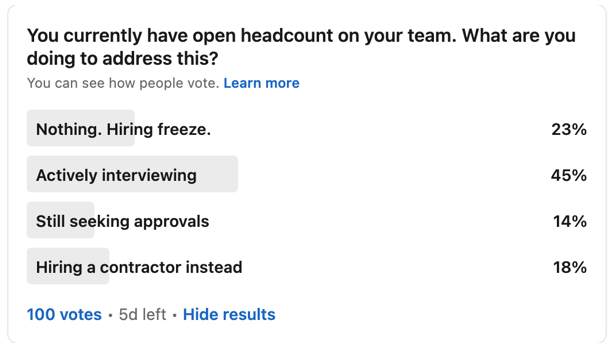
Interview: Procurement Job Market Getting Hotter


(Pic Courtesy: Mark Holyoake)
“I like work: it fascinates me. I can sit and look at it for hours. I love to keep it by me: the idea of getting rid of it nearly breaks my heart.”
-- Jerome K Jerome, Three Men in a Boat
The once-in-a-century pandemic that stopped the world in the first half of 2020 had a huge impact on employment.
Many sectors -- from travel to hospitality services -- were badly hit. However, things are changing now. With the ushering in of 2021, the employment situation is beginning to look up in many sectors.
One of the foremost questions that comes to mind is what kind of an impact did the pandemic have on the procurement job market?
To assess the broader impact, Beroe conducted a survey among Beroe LiVE members and spoke to Mark Holyoake, a recruitment specialist whose sole focus has been helping procurement professionals secure good jobs -- his firm Holyoake Search has exclusively focused on the procurement function for nearly a decade now.
It was around noon in New York when Mark answered Beroe’s phone call.
Q: Do you remember the moment you first realized that the normal way of life may soon be disrupted by the COVID-19 pandemic?
Mark Holyoake: Well, yes. It was February 2020, and I was at a procurement technology conference in San Francisco. Very few people were talking about the COVID-19 outbreak in China then, but as I boarded the plane to return to New York, I distinctly remember wearing a mask -- just me and a handful of others; there were, however, some rumblings at the airport, and I had a feeling that something big was coming our way.
Q: What did you hear from the procurement community once the strict, government-mandated lockdowns began?
Mark Holyoake: I think a lot of people in procurement went into the first few months of the pandemic feeling the same way as everyone else -- nervous and a bit overwhelmed with the changes being thrust on them, both personally and professionally. However, as the weeks progressed, I could sense a fair bit of optimism settling in as procurement professionals realized that they would probably have a job through all this, and that, in fact, their role might even become more important. To an extent, I think that was the case -- procurement has gained prominence over the past nine months.
I think many companies have come into 2021 with a very clear agenda of leaning on procurement harder than they ever have before and, with recruitment budgets opening up again, providing the function with the investment needed to help deliver on that agenda. This is the calling that procurement has been waiting on for years -- they've got their opportunity, their chance in the spotlight. I think this year presents a wonderful opportunity to step in and show businesses what they are capable of delivering, and in a way, that goes far beyond mere cost savings. So I think there are many procurement professionals, who are pretty excited.
Q. That’s interesting to hear; so, the impact was minimal?
Mark Holyoake: At a macro level, yes. I think procurement has generally been -- if not immune -- far less affected by these downward economic trends than other areas of the business. Not least because if you’re heading into a recession, top management would certainly want to know what are you spending on, how you are managing vendor risk, and how to optimize costs, working capital, and supply chain to meet more unpredictable shifts in supply and demand -- and who would they turn to if not procurement?
Q. What about layoffs and job cuts? Did the function witness a lot of these?
Mark Holyoake: Of course, there have been layoffs and wide-scale furloughs, especially in the sectors that were hit the hardest. For example, travel, retail, and hospitality. But, in general, I’d say that procurement was affected to the extent I expected it to be, which was consistent with what I saw during the 2008–09 financial crisis.
I should admit that people who have been affected, who have been unemployed or laid off, may not agree with my assessment that the procurement function has emerged relatively unscathed from this pandemic. Those job losses are very real and, in some cases, unlikely to return, and I have made it my mission over the past nine months to help those people however I can.
Q. Which end of the hierarchical spectrum witnessed the most recruitment activity in the middle of the pandemic?
Mark Holyoake: There has been a lot of activity at the senior-most end of the procurement recruitment market. In the middle of the pandemic, companies realized that they needed a robust procurement function in place, managed by a strong leader on top. So, even amid layoffs, many companies were quietly and confidentially running active searches for procurement executives, so that they could develop a plan to execute as soon as they could start hiring again in earnest.
At the senior-most end of the market, 2020 was, I think, a fairly active year. For the rest of the market -- directors, managers, etc. -- I think it took a little bit longer, at least into the fourth quarter and, in some cases, as recently as the new year.
Q. How is the current job situation? Is it looking good?
Mark Holyoake: I think it’s pretty hot now, and we’re busy handling quite a large number of recruitment assignments. The idea that there are a ton of talented procurement professionals out there just waiting for someone to call them about a job is simply not accurate, in my opinion. I think those numbers are far lower than many people would believe -- and what you read in the more mainstream media doesn’t fully capture the undercurrent. I am at the moment [at the time of this interview] running a poll among those in my professional network. Per my latest data, the number of companies actively interviewing to fill up vacancies is double of what it was back in July 2020, twice as many are able to hire contractors for additional support to their efforts, and hiring freezes have reduced by more than half.

Source: Mark Holyoake
Q. With increasing technology adoption, do you see the size of procurement teams in large organizations shrinking?
Mark Holyoake: I definitely think technology will eliminate some roles, particularly those that are more transactional, administrative, or repetitive in nature --2021 will likely see a strong uptick in technology investments. By the same token, I don’t expect to see a net loss of jobs across the procurement profession. Quite the opposite, in fact.
Q. That’s a very interesting point -- “no net loss of jobs.” Could you please elaborate?
Mark Holyoake: I just think that for every large company that is looking to automate, there are 10 smaller ones looking to stand up a procurement function for the first time, something they wouldn’t have considered doing five years ago because procurement wasn’t seen to have that kind of strategic importance.
What form those net new jobs will take, though, remains to be seen. The pandemic has disrupted a lot of well-laid recruitment plans, and I think we need some more time for the dust to settle. I do, however, think there’ll be more diversity in terms of how companies choose to get the resources they need to do a job. Rather than companies building massive procurement teams, they may go in for a more flexible staffing model, with greater utilization of contract labor. This trend would certainly make sense given the way the gig economy continues to grow.
Q. How’s the scene looking for fresh graduates? Are companies looking to hire them for the procurement function straightaway?
Mark Holyoake: Absolutely! Procurement has become a “destination function,” with graduates from all manner of disciplines seeking this part of the business out specifically because they can make such an impact there and because it now provides them with a springboard to move up into other strategic roles. Not only that, even graduates of procurement-specific programs likely have a really good handle on the broader integrated supply chain function as well, and their understanding of where procurement fits into the bigger picture is the exact skill set that companies are currently after.
Also, anecdotally, the people who are teaching the specialized procurement courses are also telling me about how diverse their classrooms are.
Lack of diversity, particularly at the leadership level, has been a persistent issue within procurement. Though there are some people in the industry who are working very hard to address these inequalities, it’s a big issue to tackle, and things will take time to change for the better. However, as an example, when faculty members tell me that women make up 60 percent of their students, it’s absolutely fantastic. No, it doesn’t solve the issues of today, but it’s certainly encouraging for the future of the profession.
Related Insights:
View All
Get more stories like this
Subscirbe for more news,updates and insights from Beroe







H
T